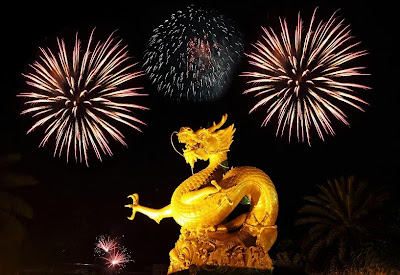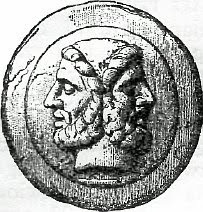By Analea Styles
 |
| New Year's Celebration in London, 2011 http://www.dailymail.co.uk/news/article-1343000/New-Year-2011-London-sees-New-Year-display-Thames.html |
New Year celebrations are some of the oldest traditions and
have been observed around the world for thousands of years. The ancient people loved to celebrate just like you and I! Many cultures carefully marked the days and looked forward to their yearly traditions. The early celebrations were marked by astronomical or seasonal indicators such as the
arrival of spring or the equinox.
Akitu
The earliest known celebration of the New Year apparently dates back to
2000 BC in the Babylonian Empire. It was the most important Babylonian festival,
occurring at the time of the vernal (Spring) equinox[1]
(approximately March 23). They honored the rebirth of the world with this multi-day
festival in which the gods were paraded through the streets and several
different rites were enacted to symbolically cleanse and recreate the world in
preparation for spring.[2]
Chinese New Year
 |
| Chinese New Year fireworks http://globerove.com/china/chinese-new-year-fireworks/1636 |
Originating over 3000 years ago, the Chinese New Year is one
of the oldest traditions that is still celebrated today. It began as a
celebration of the arrival of spring but later became mixed with legend and
myths. One such legend claimed that there was a horrible creature named Nian
who would attack villages on New Year’s Day and in order to protect themselves,
villagers would decorate their homes with red trimmings, burn bamboo and make
loud noises to scare him off. These traditions of bright colors and lights
continue today in their celebration of the New Year. The Chinese were the first to use fireworks in their
festivals as well, a tradition many of us enjoy today. [3]
Wepet Renpet
In Egypt, culture and traditions were closely tied to the
Nile River. Their New Year celebration corresponded with the annual flood that took
place around mid-July at the heliacal rising (when the star Sirius first became
visible after its 70-day absence). Just as in Babylon, the New Year was seen as
a time of rebirth and rejuvenation and honored with special rites. They would
also celebrate with revelry, drunkenness, and music. [4]
Nowruz
In the Middle East and parts of Asia, Nowruz has been
celebrated for over 2000 years. It always begins on the first day of spring and
celebrates the concepts of “End and Rebirth”, “Good and Evil”.[5]
It is a feast of “rebirth and rejuvenation that injects fresh and warm blood
into the veins of the frosty and frozen nature”[6].
It lasts 13 days and is even today considered a global festival.
Celebration of Janus
In Rome, the New Year used to correspond with the vernal
equinox and welcomed spring into the world. However through the years it
changed many times, as the calendar was repeatedly adapted to each new ruler’s
wishes. It was finally established on the familiar date of January 1.[7]
For the Romans, January was an especially significant month
because it is named after their god Janus. Janus has two faces, each in
opposing directions and symbolizes looking back to the old and ahead to the
new. The Romans liked to start the year off positively, exchanging well wishes
and gifts and giving offerings to Janus in hopes of good fortune.[8]
In time the Catholic Church adopted this Roman celebration
and though it was repeatedly moved to different dates throughout the centuries,
it has been annually celebrated on January 1 since 1582 (after Pope Gregory’s
calendar reform).
The New Year Today
You may have noted several modern-day New Year's traditions
that clearly came from some of these ancient celebrations. If you look into
more New Year’s festivities, you may find that they too have their roots in
ancient practices.
These celebrations of New Year’s Day clearly portray man’s
desire for rebirth and renewal and life. A New Year brings hope and promise. It
is a new start and symbolizes completion of a year gone by.
Ever since Adam and Eve sinned and death came into the world
through that sin (Romans 5:12), man has been aching to get back what we lost. Death
and decay and struggle were not part of God’s original creation and will not be
part of our promised future. But until then, we are constantly reminded of sin
due to the effects of the curse upon creation.
And just like those ancient men and women ached for the
rebirth and rejuvenation of spring and celebrated the promise of another year,
we look forward to finishing the race, pressing on towards the goal and finally
being with Christ one day.
For
the grace of God has appeared, bringing salvation
to all men, instructing us to deny ungodliness and worldly desires and to live sensibly,
righteously and godly in the present age, looking for the blessed
hope and the appearing of the
glory of
our
great God and Savior, Christ Jesus, who gave Himself for
us to redeem us from
every lawless deed, and to purify for Himself
a people for His own
possession, zealous for good deeds. (Titus 2:11-14)
[1] Two Faces of New Years. Yahweh’s
Restoration Ministry. http://yrm.org/two_faces_newyears.htm.
Accessed December 10, 2013.
[2] Andrews,
Evan. 5 Ancient New Years Celebrations. History
Lists. http://www.history.com/news/history-lists/5-ancient-new-years-celebrations.
Accessed December 10, 2013.
[3] Ibid.
[4] Ibid.
[6] Ziabari,
Kourosh. An Introduction to the Ancient
Festival of Nowruz. 2013. http://www.foreignpolicyjournal.com/2013/03/27/an-introduction-to-the-ancient-festival-of-nowruz/.
Accessed December 10, 2013.
[7] New Years. http://www.novareinna.com/festive/newyear.html.
Accessed December 11, 2013.
[8] Andrews,
Evan.



No comments:
Post a Comment